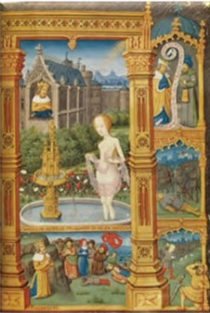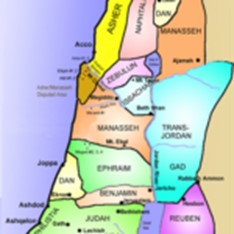Bathsheba the Seventh Wife of King David

Bathsheba was the most famous of all of King David’s wives. This story is set against the backdrop of war. King David was fighting against the Ammonites, a tribe from east of the Dead Seas which is todays Jordan. King David stayed behind in Jerusalem. King David already had many wives he could have visited during the fitful night he observed Bathsheba bathing. The story of Bathsheba and David has demonstrated so intriguing that bits and pieces have been used for countless romance novels, movies and daytime dramas.
2 Samuel 11:1-26, 2 Samuel 12:15-25; 1 Kings 1:1-37, 1 Kings 2:10-25
King David first saw Bathsheba when he rose from his bed, and walked upon the roof of the king’s house. He saw her washing herself. She was probably was washing herself on the flat roof in a tented area that was often used by women. Bathsheba was a beautiful woman who was the daughter of Eliam and the wife of Uriah the Hittite.
2 Samuel 11:4 tells us that David sent messengers, and took her; and she came in unto him, and he lay with her; for she was purified from her uncleanness: and she returned unto her house. This is an important point that Bathsheba was washing herself after her menstrual period which shows she was not pregnant with her husband, Uriah’s child. Bathsheba was at the stage in her menstrual cycle when she was likely to conceive.
This was a problem because Uriah, the Hittite was away at war and he could not be the father of her baby. King David sent for him from the battle field and talked about the war then sent him home to be with his wife. Uriah was an honorable man and would not go home because his fellow soldiers were abiding in tents in open fields. He felt it would be wrong for him to go to his house to eat and drink and lie with his wife under these circumstances.
King David was less honorable when he wrote a letter to Joab and had Uriah carry it. The letter instructed that Uriah be sent to the forefront of the hottest battle and then leave him there so he may be smitten and would die. Just as the plan was set in motion Uriah was killed. Bathsheba mourned for her husband. The time of mourning was usually seven days. (Smith).
When the mourning period was past, David sent and fetched Bathsheba to his house, and she became his wife, and bares him a son. But the thing that David had done displeased the LORD. The LORD struck the child that Bathsheba and David conceived and it became very sick and died.
King David comforted Bathsheba his wife, and went in unto her, and lay with her: and she bares a son, and he called his name Solomon: and the LORD loved him. It does speak volumes that David comforted Bathsheba. The Bible tells us that David had extremely grieved over the sickness of the child. When the child died David did not just think about his sorrows, he comforted Bathsheba. This is an indication that Bathsheba also grieved David cared about her pain.
This is tragic for both David and Bathsheba. David lost his integrity; many others were affected by this loss of integrity. David received forgiveness for the LORD he still had to live with the consequences of his sin for the rest of his reign.
The next time we see Bathsheba is at the death of King David and her son Solomon becomes his successor. Bathsheba conspirers with the prophet Nathan to convince the aging King David that Solomon should succeed him. Solomon was made king instead of Adonijah. (1 Kings 1:15-17).
King David had 19 sons by his seven wives according to 1 Chronicles 3:1-9. Bathsheba had four; Shimea (also spelled Shammua, 1 Chronicles 14:4), Shobab, Nathan, and Solomon. Nathan (Luke 3:31) and Solomon (Matthew 1:6) appear in New Testament genealogies of Jesus Christ.
David had problem in his family he had a son, Amnon, that raped his own half-sister, Tamar. Tamar lived with Absalom after the rape. His son Absalom saw the injustice against his sister and two years later killed that brother. David probably did nothing to speak to this injustice because of the moral compromise with Bathsheba and this left David vulnerable to criticism. Absalom had resentment against his father and this is what led to Absalom’s rebellion. (2 Samuel 13:1-32).
Absalom was power hungry with great resentment of David. Absalom stood on the rooftop of the palace in full view of all the people and took the concubines of his father David. (2 Samuel 16:22). Nathan had told David, “What you did in secret will be done to you in broad daylight.” David had stolen another man’s wife and tried to cover it up. (Barr, 2011, p.69).
The later years for King David were not productive. During this time the sexual effectiveness of the king was associated with the state of the nation. It was considered a bad omen when the king could not have more children. There was a search throughout the territory of Israel to find a beautiful girl for King David. The servants of King David found, and brought her to the king. The damsel was very fair, and cherished the king, and ministered to him: but the king knew her not. (1 King 1:1-4).
This meant it was time for co-regency. Someone would rule alongside David, to help him. Adonijah, the son of Haggith decided it would be the one to be prepared as the next king. Adonijah was impatient for power and was the oldest surviving son. Adonijah did not wait for the death of David but instead raised an army of chariots and horsemen and fifty men to run before him. (1 King 1:5).
Nathan the prophet, Bathsheba and Solomon did not support this proclamation that Adonijah would be the next king. This would mean that Bathsheba and Solomon would be killed because Solomon was also a contender to the throne.
Bathsheba went in to the chamber of King David she persuaded King David to swear by the LORD God that Solomon shall reign after him and sit upon the throne of David. Bathsheba reminded the king that once he died, she and Solomon would be in danger. Bathsheba pleaded with King David and reminded him that Solomon remained loyal to him. She used the knowledge she had of David and pleaded with his protective nature, his love of the LORD, also she reminded David he was still the king and not Adonijah. Bathsheba made a rousing plea.
King David called Zadok the priest, and Nathan the prophet, and Benaiah the son of Jehoiada. Per the request of David Zadok, the priest and Nathan the prophet anointed Solomon king over Israel, and blew the trumpet and said “God save king Solomon.” Solomon was instructed to sit upon the throne of David who should be king in his stead. King David appointed him to be ruler over Israel and over Judah. (1 Kings 1:15-40.)
Solomon became king after the death of David and Bathsheba held the title of Queen mother. This was the most powerful position that a woman could hold. The story of Bathsheba has special significance for Christians. In the gospel of Matthew, four women are included in the genealogy of Jesus (Matthew 1:2-17). Some may say Bathsheba was a victim. The biggest attribute that Bathsheba can teach us is bouncing back. Many times, in our life we, as woman, have the potential of becoming victims. It is how we bounce back that is important. Bathsheba was instrumental in advancing her son Solomon in becoming the king after the death of David. Solomon was the wisest of kings of Israel.
The attributes of Bathsheba were that she was accomplished, intelligent, and skillful. Bathsheba produced a son, Solomon, who was known throughout history for his wisdom and intellectual brilliance. She remained faithful and dedicated to David. She showed courage in the time of danger. Bathsheba was honored and even her son, the king bowed down before her. Solomon even made a place so she could sit next to him on his throne. Bathsheba sat on the right hand of King Solomon. This is a place of honor, and indicated a share of power. (1 Kings 2:19-25).
References:
Barr, Adam T. (2011), Exploring the Story: A Reference Companion, Grand Rapids, MI: Zondervan
Smith, James E. (1995), The Books of History, Old Testament Survey Series, Joplin, MO: College Press
Cite Article Source
MLA Style Citation:
Holstein, Joanne “Bathsheba the Seventh Wife of King David:.” Becker Bible Studies Library Oct 2014.< https://guidedbiblestudies.com/?p=1642 ,>.
APA Style Citation:
Holstein, Joanne (2014, October) “Bathsheba the Seventh Wife of King David:.” Becker Bible Studies Library. Retrieved from https://guidedbiblestudies.com/?p=1642 ,.
Chicago Style Citation:
Holstein, Joanne (2014) “Bathsheba the Seventh Wife of King David:.” Becker Bible Studies Library (October), https://guidedbiblestudies.com/?p=1642, (accessed).

